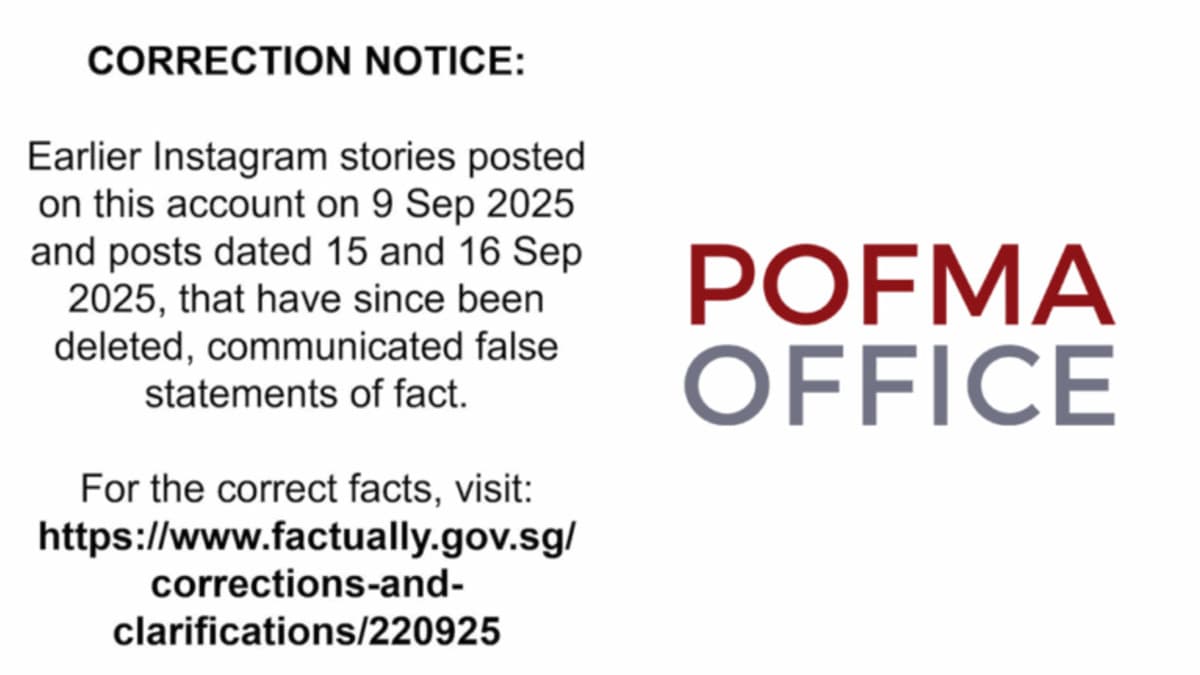Government issues POFMA Correction Directions to Nicholas Tan and Aupen
The Ministry of Law has directed the issuance of Correction Directions to fashion brand Aupen and its founder, Nicholas Tan, over Instagram posts that allegedly contained false claims about the Intellectual Property Office of Singapore (IPOS) and the country’s trade mark regime.

- Correction Directions issued to Nicholas Tan and Aupen under POFMA.
- Posts allegedly made false claims about IPOS’s impartiality and Singapore’s trade mark laws.
- IPOS clarified that it did not advise Tan against legal action and that Singapore’s trade mark regime treats all businesses equally.
The Ministry of Law announced on 22 September 2025 that Minister for Law and Second Minister for Home Affairs Edwin Tong had instructed the POFMA Office to issue Correction Directions to Nicholas Tan and his company, Aupen, following a series of public statements made on Instagram.
The statements, according to the Government, contained false and misleading claims about the Intellectual Property Office of Singapore (IPOS) and the country’s trade mark system.
The Correction Directions were issued under the Protection from Online Falsehoods and Manipulation Act (POFMA). The Ministry said the posts could mislead the public and “undermine confidence in the impartiality of Singapore’s intellectual property institutions.”
The disputed content was posted between 9 and 16 September 2025 through Tan’s personal account (@nicktandurian) and Aupen’s official account (@aupenofficial).
Summary of disputed claims
According to the Government, the false claims included:
-
That IPOS advised Tan not to pursue a trade mark dispute with U.S. retailer Target because he would likely lose;
-
That Singapore’s trade mark laws favour foreign companies over local businesses;
-
That legal reform to prevent bad-faith trade mark registrations was impossible;
-
That IPOS supports foreign companies but not local ones in trade mark disputes; and
-
That IPOS contradicted itself in public statements about the matter.
Authorities rejected these claims as inaccurate and misleading.
Background: The Aupen–Target dispute
The case stems from a potential trade mark conflict between Aupen and U.S. retailer Target.
Target registered the “AUDEN” mark in both the United States and Singapore in 2018, while Aupen registered its “AUPEN” mark in Singapore in 2023 and has since applied for registration in the U.S.
On 25 August 2025, Aupen’s Instagram account published a post alleging that Target had relaunched products under its AUDEN brand that resembled Aupen’s designs. The post included an image of a letter from Target referencing potential consumer confusion in the U.S. market.
IPOS later clarified that trade mark rights are territorial — meaning a dispute in the U.S. does not affect a valid Singapore registration unless a local challenge is filed.
IPOS’s engagement with Aupen
After learning of the post, IPOS met Tan on 1 September 2025 to discuss the issue.
During the meeting, Tan described his potential dispute with Target and confirmed that he was already receiving legal advice. IPOS said it reassured Tan that Aupen’s Singapore trade mark remained valid, as no opposition or revocation had been filed locally.
The agency emphasised that it does not offer legal advice or take sides in commercial disputes, but provides general guidance and information on procedures.
It also advised Tan to consult his lawyers if he wished to take further legal action, such as revoking Target’s Singapore registration.
Government clarification on Singapore’s trade mark regime
The Ministry of Law reiterated that Singapore’s trade mark laws apply equally to local and foreign applicants.
IPOS stated that the suggestion that foreign firms receive preferential treatment is false, highlighting several initiatives that support local enterprises, such as IP Legal Clinics, GoBusiness IP Grow, and consultation services with IP strategists.
Addressing claims that legal reform was impossible, IPOS said Singapore’s laws already prohibit bad-faith trade mark registrations. It added that during the September 1 meeting, Tan was informed that he could formally submit his feedback on potential reforms, though any changes would take time to review — not that reform was impossible.
Events leading to POFMA action
Following IPOS’s media statement on 11 September 2025, which sought to correct “false and misleading” claims in Aupen’s earlier post, Tan published another post on 16 September, suggesting IPOS had “flip-flopped” on its position.
The Government said this accusation was false, asserting that IPOS’s communications were consistent and factual throughout its dealings with Tan.
On 22 September, Minister Edwin Tong directed the POFMA Office to issue Correction Directions to both Tan and Aupen.
Because the original posts had already been deleted, both parties were instructed to post new Instagram Stories containing a link to the Government’s clarification on the Factually website. These were published later that same day in compliance with the order.
About POFMA and its application
Under the Protection from Online Falsehoods and Manipulation Act, a Correction Direction requires recipients to publish a notice linking to official clarifications, ensuring that readers are informed of the Government’s position.
Recipients may also apply to the Minister for reconsideration and, if rejected, appeal to the High Court.
The Ministry of Law said the Correction Directions were necessary to “prevent the spread of falsehoods that could mislead the public about Singapore’s trade mark system and the integrity of its institutions.”







